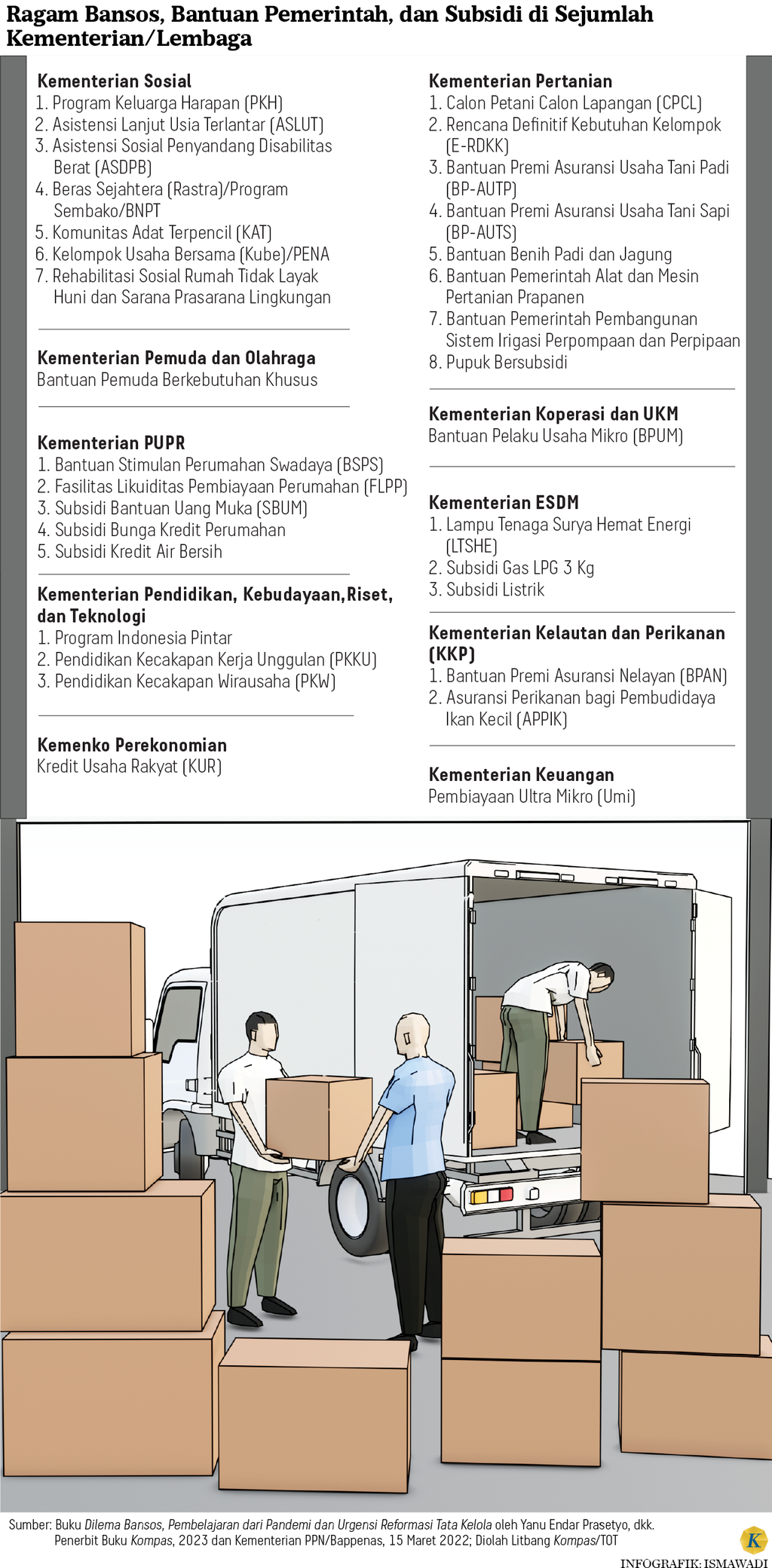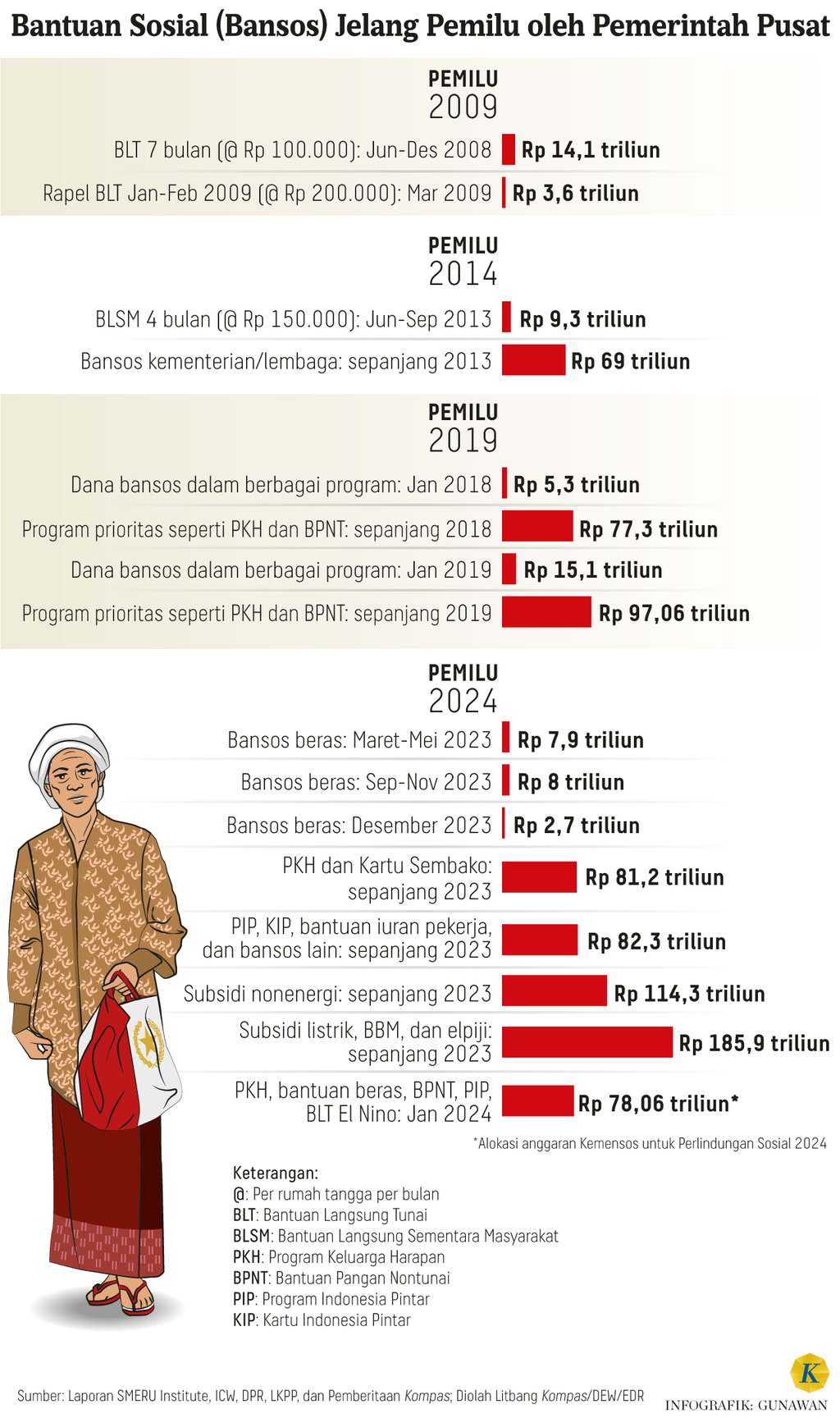Social Assistance, from State Aid to Politicization
Not just assistance, social assistance can also be seen as an effort by the state to bind its citizens in political ties.
This article has been translated using AI. See Original .
The following article was translated using both Microsoft Azure Open AI and Google Translation AI. The original article can be found in Bansos, dari Bantuan Negara hingga Politisasi
/https%3A%2F%2Fasset.kgnewsroom.com%2Fphoto%2Fpre%2F2023%2F10%2F25%2F49dc3a18-2a8d-4334-82bd-d410ddff3797_jpg.jpg)
Residents bring aid rice delivered by President Joko Widodo to 500 families at the Bulog Warehouse in West Sumatra, Padang City, on October 25th, 2023. On the occasion, the President also provided direct cash assistance in anticipation of El Nino amounting to Rp 400,000 for two months, November-December 2023.
Social assistance programs or bansos are not new in Indonesia. In accordance with the constitutional mandate, the state provides a charitable program in the form of social assistance, as part of the social protection scheme. However, the nature of social assistance which has a direct impact on meeting people's needs is very vulnerable to being politicized.
As the general election draws nearer, social assistance programs are often associated with electoral commodities. This cannot be separated from the findings of several social assistance packages that contain messages or pictures of certain candidate pairs. Social assistance in the form of 10 kilograms of rice with the image of a presidential candidate pair was found in several districts in Central Java and the photo circulated on the messaging app WhatsApp.
The daily investigative report Kompas, Thursday (18/1/2024), also found many cases of politicization of social assistance by legislative candidates in electoral districts. By manipulating the Family Hope Program (PKH), the legislative candidates are using the message to get voters in the area to vote for the legislative candidate later.
Also read: DPR Candidates Hijack Social Assistance Programs
Social assistance or direct cash transfer (BLT) is a means of government assistance that is given to citizens who are experiencing economic difficulties. The Law Number 11 of 2009 regarding Social Welfare, which was amended to Law No. 14/2019 regarding Social Workers, states that social assistance is part of a social protection scheme aimed at preventing and addressing the risks of social shocks. Social assistance is intended to ensure that individuals, families, or vulnerable social groups can continue to live their lives in a dignified manner.
This social protection scheme was implemented during the 1998 economic crisis. At that time, the government implemented a social safety net policy through four programs, namely Food Security, Labor Intensive, Social Protection, and Small and Medium-sized Industry Development programs. This policy was formulated in Presidential Decree No. 190/1998 on the Establishment of a Task Force for Improving the Social Safety Net.
Similar policies have also been implemented by the government in facing the impact of the pandemic crisis. During the Covid-19 pandemic period from March 2019 until the end of 2022, various forms of social assistance have proven to be very helpful for the economy of communities affected by the slowdown of economic activities due to the large-scale social restrictions (PSBB) and the implementation of community activities restrictions (PPKM).

Vulnerable to fraud
Social assistance is often used as a means of manipulation and a tool to influence political choices due to its direct impact on the recipients. This makes such state aid susceptible to being labeled as personal assistance instead.
Even social aid funds have become the target of corruption by certain officials, including those allocated for Covid-19 relief efforts. Former Minister of Social Affairs, Juliari P Batubara, was sentenced to 12 years in prison by the Jakarta anti-corruption court in August 2021, after being found guilty of corruption in the procurement of social aid for Covid-19 affected communities in the Jabodetabek area in 2020. This shows that not only is the politicization of social aid a problem, but corruption also plagues its distribution.
Juliari was proven to have ordered authorized officials to use the Ministry of Social Affairs' budget and officials making commitments from the Ministry of Social Affairs to collect a fee or reward of IDR 10,000 per basic food package from companies involved in procuring social assistance for handling the Covid-19 pandemic in 2020.
/https%3A%2F%2Fasset.kgnewsroom.com%2Fphoto%2Fpre%2F2021%2F04%2F01%2F4c87e0e1-344b-4817-ab4e-6631861b47cf_jpg.jpg)
Former Social Minister Juliari P. Batubara was at the Corruption Eradication Commission (KPK) building in Jakarta on April 1, 2021. Juliari was involved in a corruption case related to the procurement of Covid-19 social assistance.
At that time, the Ministry of Social Affairs managed 1.9 million social assistance packages in the Jabodetabek area with a budget value of IDR 6.8 trillion. Each package is budgeted at IDR 300,000 and distributed 12 times. The total compensation received was IDR 32.4 billion. Some of the money went to Juliari, Rp. 15.1 billion. The money also flowed to a number of Ministry of Social officials to buy expensive bicycles, houses, and pay down payments on cars (Kompas, 24/8/2021).
Not only during the pandemic. Previously, cases of corruption and mismanagement of social aid were also uncovered in 2012. An examination by the Audit Board of Indonesia (BPK) of the government's 2012 financial report found weaknesses in the control of social aid spending. These weaknesses began from budgeting, implementation, to accountability.
Even in the examination results of the 2012 fiscal year, problematic social assistance funds worth IDR 31.66 trillion were found. The allocation of social assistance funds in ministries, institutions, and local governments is one of the sectors where indications of embezzlement and corruption are most frequently found.
Also read: Social Assistance Disbursed Ahead of the Election, Is It a Coincidence?
It's no wonder that the Corruption Eradication Commission (KPK) eventually issued a circular requesting the government freeze social aid funds until the elections were over, due to the risk of misuse. At that time, the head of the Financial Transactions Reports and Analysis Center (PPATK), Muhammad Yusuf, also requested that the social aid funds not be disbursed until clear parameters were established, especially approaching the 2014 elections. PPATK had previously uncovered suspicious financial transactions related to the use of the social aid funds.

Data integration
On the other hand, one of the biggest challenges for social assistance programs (bansos) is the lack of a comprehensive roadmap, including the absence of guidelines on when bansos will be distributed and when they will be stopped. The roadmap should cover the basic philosophical perspective of bansos, as well as policies, substance, and technical implementation.
The challenges that need to be overcome include data accuracy, target outreach, vulnerability, transparency, and accountability. This is due to the predicted possibility of economic crises, recessions, and even pandemics happening again in the future.
Referring to the publication "The Dilemma of Social Assistance, Lessons from the Pandemic and the Urgency of Governance Reform (2023)", the roadmap preparation cannot be built exclusively without the participation of civil society organizations. Therefore, aspects of social assistance policy design have adequate accountability, transparency, and adaptation.
The government also needs to expedite the Satu Data Indonesia (SDI) project to be used as the basis for population data because synchronization and harmonization of data for social assistance beneficiaries is still very weak. Currently, there is still a difference between the BPS and Dukcapil population data and they have not been fully integrated.
/https%3A%2F%2Fasset.kgnewsroom.com%2Fphoto%2Fpre%2F2022%2F11%2F28%2F69f95981-79df-4c77-87b8-44e46ebcdc90_jpeg.jpg)
Supervisors captured images of cash aid recipients at Kaponan Village Hall, Pakis District, Magelang, Central Java (28/11/2022).
Updating the Integrated Social Welfare Data (DTKS) needs to continue at the village and neighborhood level as the front guard of social assistance beneficiary data collection. Currently, there is still no consistent standard, resulting in overlapping data production still occurring.
The BPK also conducted an examination of social assistance and found several mistakes that harmed the country. First, the families receiving benefits (KPM) from the PKH and sembako/BPNT programs, as well as cash social assistance (BST), were not listed in DTKS.
Secondly, they are also not included in the proposal submitted by local governments through the Social Welfare System-Next Generation (SIKS-NG) application. Thirdly, there are still Beneficiary Families of the Social Cash Transfer program who had problems in 2020 but still received assistance in 2021. Fourthly, Beneficiary Families with invalid identification numbers, and fifthly, Beneficiary Families who have been reported deceased but are still receiving double assistance.

The country says hello
Social welfare assistance is a constitutional mandate and has been given the green light by the DPR. In fact, during the Covid-19 pandemic, the government has been granted leeway to widen the APBN deficit by more than 3 percent of GDP, which exceeds the provisions set out in the State Finance Law.
However, policies regarding the distribution of social aid during the pandemic are varied and scattered across every government agency, both at the central and regional levels. Many social aid programs are dispersed among various ministries/agencies. There are at least 89 programs categorized as social aid, government assistance, or subsidies for the less fortunate members of society.
However, the government noted the success of social assistance in helping people reduce the burden of life during difficult conditions. Based on the results of the Kompas survey in December 2023, daily economic conditions were what respondents complained about most. The public always complains about the price of basic necessities, employment opportunities and the family economy as the three main problems in their lives.
The Ministry of Finance stated that the effectiveness of social assistance can be seen in its ability to lift the economic conditions of the society during a pandemic. This is also evident now, as the government's distribution of social assistance has greatly helped the economic condition of the people.
Also read: Economy Down, Social Assistance is Appreciated
For the year 2024, nearly Rp 450 trillion of social assistance funds have been budgeted for various sectors. Not only for the final months of 2023, President Joko Widodo has even planned for social assistance until the second round of elections to maintain the economic condition of the community.
In the end, bansos is actually felt more as a greeting from the state to its citizens who directly feel its benefits. Bansos can also be seen as the state's effort to bind its citizens in self-interest and political vulnerability. (LITBANG KOMPAS)
Also read: Crisis Safety Nets